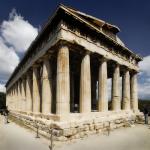|
This section contains 955 words (approx. 4 pages at 300 words per page) |

|
Distinguished Group. Among the thinkers of fifth century Athens were a group who have come to be called the "Older Sophists." Whether they held any common ideological positions or not is somewhat questionable, as are the criteria by which scholars should decide whether to consider a given thinker a Sophist. The question is further complicated by the shifting meaning of the term. In the fifth century it seemed to be applied mainly to people who were known for their knowledge (for example, Socrates), and those who earned money by teaching advanced pupils (for example, Protagoras), and seemed to be a somewhat neutral term, although often used with pejorative overtones, but by the fourth century the term becomes more specialized, limited to those who taught rhetoric, specifically the ability to speak in assemblies or law-courts. Sophistic skills could promote injustice (such as demagoguery in...
|
This section contains 955 words (approx. 4 pages at 300 words per page) |

|




